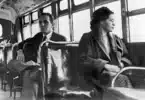There’s something powerful about movies. They are sensory experiences that connect audiences to emotions they might not feel in other contexts These emotions can inspire awareness and action. Movies also raise intriguing questions about the depiction of human rights, history, and real-life people. The line between exploitation and honesty is often blurry. For those interested in film, here are ten human rights movies to watch and think about:
First They Killed My Father (2017)
Director: Angelina Jolie
Writers: Loung Ung / Angelina Jolie
As a child, Loung Ung lived in Phnom Penh. Her father worked as a high-ranking government official. Life was good for Luong. In April 1975, Pol Pot’s Khmer Rouge army captured Phnom Penh. Loung’s family fled, but were soon caught and subjected to beatings, labor camps, and hunger. Loung was trained as a child soldier. Based on Ung’s memoir of the same name, First They Killed My Father is a Cambodian-American Khmer-language film. It was filmed in Phnom Penh and released on Netflix.
He Named Me Malala (2015)
Director: Davis Guggenheim
Writer: Malala Yousafzai (inspired by the book I Am Malala)
This documentary tells the story of Malala Yousafzai, a young Pakistani activist named after an Afghani folk hero. In 2012, Malala was shot by the Taliban, but survived. He Named Me Malala traces the events leading up to the assassination attempt and after, including Malala’s speech to the United Nations. In 2014, at age 17, Malala became the youngest Nobel laureate when she was the co-recipient of the Nobel Peace Prize.
City of Joy (2016)
Director: Madeleine Gavin
Writer: Madeleine Gavin
In the city of Bukavu, there’s a compound known as “City of Joy.” Part health center, part dojo, and part sanctuary, the City of Joy is home to women as they focus on healing from psychological and physical trauma like unwanted pregnancies and rape. The three founders of the City of Joy center – Nobel Peace Prize winner Dr. Denis Mukwege, activist and playwright Eve Ensler (also known as V), and activist Christine Schyler-Deschryver – are close at hand. While this documentary deals with heavy themes, it focuses on hope.
Beasts of No Nation (2015)
Director: Cary Joji Fukunaga
Writer: Cary Joji Fukunaga
When civil war reaches 12-year old Agu (Abraham Attah), he runs. He’s caught by rebel guerrilla fighters, whose leader (Idris Elba) trains him as a child soldier. Based on the novel of the same name by Uzodinma Iweala, the film doesn’t specify which West African country it’s set in, but Fukunaga spent years researching the civil war in Sierra Leone. Beasts depicts the brutal physical and emotional traumas that child soldiers endure.
13th (2016)
Director: Ava DuVernay
Writers: Spencer Averick / Ava DuVernay
In 1865, the United States abolished slavery through the 13th amendment. There was an important caveat: slavery was abolished except as a punishment for a criminal conviction. In 13th, DuVernay argues that this amendment allowed slavery to persist in a new form. It justified the arrest of poor freedmen, suppressed Black Americans through Jim Crow and lynchings, and led to the War on Drugs and mass incarceration. In interviews with experts, the documentary lays out a compelling case for DuVernay’s thesis. 13th was nominated for the Academy Award for Best Documentary Feature at the 89th Academy Awards. It’s available on Netflix.
The Whistleblower (2010)
Director: Larysa Kondracki
Writer: Larysa Kondracki / Eilis Kirwan
In 1999, the UN contracted former policewoman Kathryn Bolkovac as a human rights abuse investigator in Bosnia. Upon her arrival, she realized that many of the UN peacekeepers were participating in the sex trafficking of girls and women. When she tried to take action, her complaints were covered up and she was fired. In 2002, she sued. Rachel Weisz stars as Bolkovac with Vanessa Redgrave, Monica Bellucci, and David Strathairn in supporting roles. Ban Ki-moon (then the UN General Secretary) screened The Whistleblower for UN officials. The movie received some criticism for its portrayal of violence.
The Report (2019)
Director: Scott Z. Burns
Writer: Scott Z. Burns
Following 9/11, the Bush administration kicked off the War On Terror. In The Report, staffer Daniel Jones (played by Adam Driver) and the Senate Intelligence Committee investigate the CIA’s use of torture. A team reviews 6 million pages of CIA materials. What they discover becomes a 6,700-page report detailing the various human rights violations. Will the team be allowed to tell the truth?
Mandela: Long Walk To Freedom (2013)
Director: Justin Chadwick
Writer: William Nicholson
Based on Nelson Mandela’s autobiographical book, Long Walk To Freedom explores the icon’s life from his childhood to his 27 years in prison to his election as the first Black president of South Africa. Idris Elba stars as Mandela. The film’s producer, Anant Singh, began work on the project following an interview with Mandela while he was still in prison. Singh was then given the film rights after Mandela’s autobiography came out.
Selma (2014)
Director: Ava DuVerny
Writer: Paul Webb
Selma spans three months in 1965 as Martin Luther King Jr. planned a march for equal voting rights. Dr. King and his allies faced discrimination, death threats, and violence leading up to the iconic walk from Selma to Montgomery, Alabama. The Best Picture-nominated film stars David Oyelowo as Dr. King with Carmen Ejogo as Coretta Scott King.
Persepolis (2007)
Directors: Vincent Paronnaud / Marjane Satrapi
Writer: Marjane Satrapi / Vincent Paronnaud
When the Shah was overthrown during the Iranian Revolution of 1978-1979, Marjane was just a teenager. The resulting fundamentalist Islamic laws put many in danger, including Marjane herself, who refused to dampen her rebellious spirit. Based on Marjane Satrapi’s autobiographical graphic novel of the same name, the film translates her black-and-white art beautifully into film. Persepolis was nominated for Best Animated Feature at the 80th Academy Awards and co-won the Jury Prize at the 2007 Cannes Film Festival.












